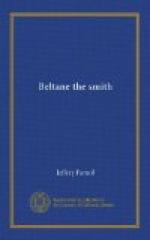“Messire Beltane,” quoth the friar, setting his rumpled frock in order, “are ye minded still to adventure breaking ope the dungeon of Belsaye?”
“Aye, verily!” nodded Beltane. “Know you the city, good friar?”
“That do I, my brother: every lane and street, every hole and corner of it—’twas there I first drew breath. A fair, rich city, freed by charter long ago—but now, alas, its freedom snatched away, its ancient charter gone, it bleeds ’neath a pale-cheeked tyrant’s sway—a pallid man who laughs soft-voiced to see men die, and smiles upon their anguish. O Belsaye, grievous are thy wrongs since Ivo came five years agone and gave thee up to pillage and to ravishment. O hateful day! O day of shame! What sights I saw—what sounds I heard—man-groans and screams of women to rend high heaven and shake the throne of God, methinks. I see—I hear them yet, and must forever. Jesu, pity!” and leaning against a tree near by, the stalwart friar shivered violently and hid his eyes.
“Why, good brother Martin,” said Beltane, setting an arm about him, “doth memory pain thee so, indeed? good Brother Martin, be comforted—”
“Nay, nay—’tis past, but—O my son, I—had a sister!” said the good friar, and groaned. Yet in a while he raised his head and spake again: “And when Duke Ivo had wrought his will upon the city, he builded the great gibbet yonder and hanged it full with men cheek by jowl, and left Sir Gui the cruel with ten score chosen men for garrison. But the men of Belsaye have stubborn memories; Sir Gui and his butchers slumber in a false security, for stern men are they and strong, and wait but God’s appointed time. Pray God that time be soon!”
“Amen!” said Beltane. Now, even as he spake came the sound of a distant tucket, the great gates of Belsaye swung wide, and forth rode a company of men-at-arms, their bascinets agleam ’neath the moon.
“Now!” spake the friar, “and you are for Belsaye, my brother, follow me; I know a way—albeit a moist way and something evil—but an you will follow,—come!” So saying Friar Martin set off among the trees, and Beltane, beckoning to the others, followed close. Fast strode the friar, his white robe fluttering on before, through moonlight and shadow, until they reached a brook or freshet that ran bubbling betwixt flowery banks; beside this strode the tall friar, following its winding course, until before them, amid the shadow—yet darker than the shadow —loomed high an embattled flanking tower of the walls of Belsaye town; but ever before them flitted the friar’s white gown, on and on until the freshet became a slow-moving river, barring their advance—a broad river that whispered among the reeds on the one side and lapped against rugged wall on the other.
Here the friar stayed to glance from gloomy wall and turret to fast waning moon on their left, then, girding up his gown, he stepped down into the reeds, and a moment later they saw him—to their amaze— fording the river that flowed scarce knee deep.




